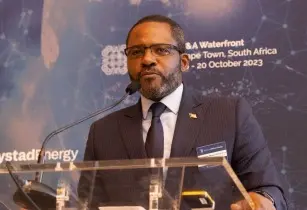Equatorial Guinea’s Minister of Mines and Hydrocarbons, Gabriel Mbaga Obiang Lima, addressed growing climate change concerns and his role in African energy diplomacy at the Invest in African Energy reception in London on 26 January, organised by the African Energy Chamber
Under the theme, OPEC, Africa and Equatorial Guinea: Why we need to continue investing in African energy, the petroleum minister emphasised the value of a diversified, balanced approach to the African energy transition.
“Everyone recognises that Africa is waking up to oil and gas,” said Minister Lima. “There are 600 mn Africans who don’t have electricity. What are we going to be transitioning from – the dark? We need to make sure that Africans have electricity, and that can come from oil, gas, renewables or nuclear power.”
“Everyone should fight so that we can have an impact on climate change. But it is the responsibility of the consumers and not the producers,” he added.
This year, Equatorial Guinea assumed the rotating presidency for both the Organisation of Petroleum Exporting Countries and the Gas Exporting Countries Forum, despite being a smaller oil producer on a global scale. In addition to amplifying the voice of African oil and gas producers within the global energy dialogue, Equatorial Guinea’s role as rotating president aims to facilitate coordination and dialogue with fellow member countries and consumers, foster more open and transparent energy markets, and more effectively attract capital and forge closer diplomatic ties with fellow member countries, withMinister Lima citing 'knowledge and technology transfer' as top priorities for mature producers like Nigeria, Angola and Equatorial Guinea.
Meanwhile, the country is leading an ambitious investment campaign aimed at establishing diversified downstream industries, while driving new exploration of existing fields and underexplored continental basins. Upstream, drilling activities at Block G have commenced and are aimed at offsetting declining production at the country’s historic Ceiba Field.
Equatorial Guinea’s downstream market is expected to grow by over 2% annually for the period 2020-2025, on the back of rising gas production and increased refining capacity, which includes the construction of two modular oil refineries in Punta Europa and Kogo, along with the ammonia and urea plants, liquefied petroleum gas (LPG) storage tanks, a methanol-to-gasoline and derivatives unit and the expansion of the existing CNG plant.
“We need to develop our own African market to produce, buy and sell gas,” underscored Minister Lima.








